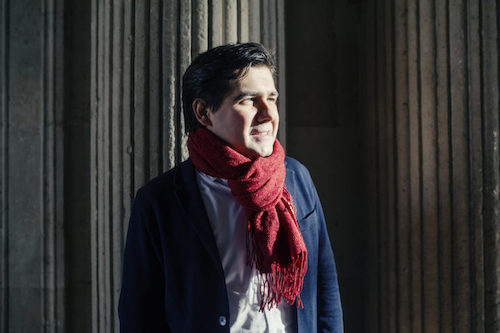Kholodenko displays exceptional artistry for Friends of Chamber Music

Vadym Kholodenko’s playing of selections from the fiendishly difficult Chopin-Goldowsky Etudes was one of the highlights of the fall 2019 music season, before the Covid pandemic brought a halt to concert performances.
On Tuesday night, the Ukrainian-born pianist returned to Friends of Chamber Music for an outstanding recital at Florida International University’s Wertheim Auditorium.
Tchaikovsky’s rarely heard Theme and Variations in F Major was an intriguing opener. A stately, balletic theme is transformed through a series of variants diverse in pianistic color and aura. Kholodenko’s dexterity and idiomatic flair for the score’s Russian ethos was manifest and his varied dynamics and coloring brought character and individuality to each variation.
Mozart in a minor key always holds a duality—light and dark musical lines probing depths of emotion. Kholodenko effectively conveyed those clashing qualities in the Molto allegro opening of the compsoer’s Piano Sonata in C minor, K. 457.
The pianist’s lithe touch was especially engaging in the quiet moments, presented with idiomatic stylishness and elegance. In the Adagio Kholodenko’s gracious shaping of the courtly melodic line suggested an instrumental operatic aria. There was ample drama and tension in the concluding Allegro assai. While the runs and classical flourishes were assayed with impeccable technique, Kholodenko also probed to reveal the pathos beneath the surface fireworks.
The program’s post-intermission half was devoted to Liszt’s transcriptions and permutations of opera and art song literature.
Liszt’s Miserere du Trovatore is almost a fantasia on one of the most original and memorable moments from the final act of Verdi’s opera. Following a grave opening, Leonora’s vocal lines thunder almost like a motif in a Liszt tone poem. Kholodenko deftly shaped Manrico’s interjections from the prison tower and the sheer velocity of the clusters of notes across the keyboard rang out with sonority that was almost orchestral.
Kholodenko’s wonderfully flowing version of Beethoven’s An die ferne Geliebte finds Liszt projecting the piano as a lyric instrument. Kholodenko’s suave and extroverted rendition of central fast episode provided needed variety. Liszt’s reworking of Beethoven’s Adelaide swirled in phrases both aristocratic and rollicking. Kholodenko’s vivid sense of musicality and momentum brought urgency and charm to transcriptions that can sound like shallow displays in lesser hands.
The familiar Réminiscences de Don Juan is based on two excerpts from Mozart’s Don Giovanni. Kholodenko made the stormy opening chords sound like a tempest from the abyss to which the rakish Don Juan has been condemned. The melody of the Don Giovanni-Zerlina duet “La cì darem la mano” was given enticing verve with light articulation in the ensuing variations. The Don’s drinking song (“Fin ch’han dal vino”) emerged almost Chopinesque in lilt. The Commendatore’s grave condemnation of the protagonist’s evil deeds brought a power-pounding finale from the pianist.
The audience, on its feet, was not about to let Kholodenko go without an encore. He offered the Prelude to Wagner’s Tristan und Isolde. Kholodenko’s straightforward reading was all the more effective for its restraint, the impassioned music’s romantic passion singing out with natural eloquence, a beautiful conclusion to an evening of exceptional music-making.
Friends of Chamber Music presents the Hermitage Piano Trio 8 p.m. March 7 at the FIU Wertheim Auditorium. The program features Turina’s Trio, Ravel’s Piano Trio and Rachmaninoff’s Trio Elegiaque No. 2. miamichambermusic.org
Posted in Performances
Leave a Comment
Wed Feb 9, 2022
at 11:59 am
No Comments